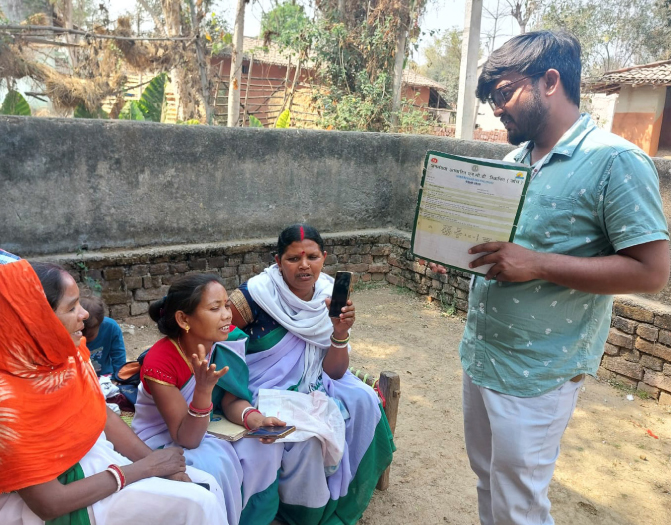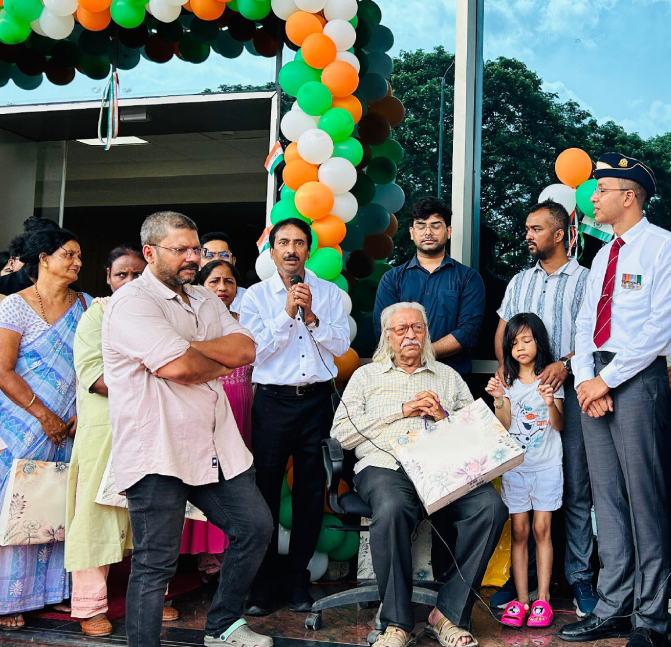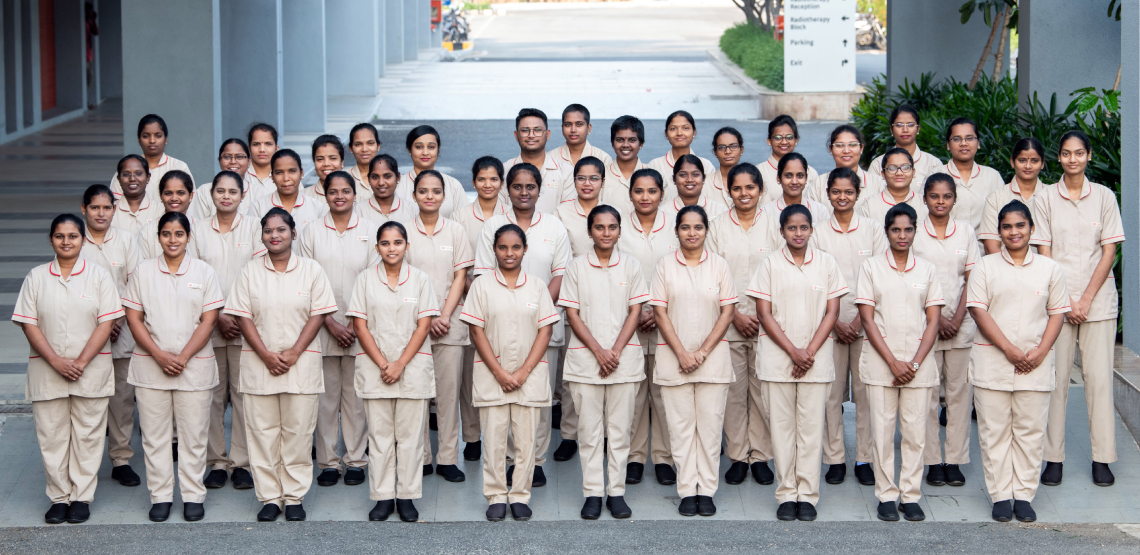Sturdy in support
The Tata Cancer Care Foundation and the Assam Cancer Care Foundation are the custodians of the Tata Trusts’ countrywide cancer initiative
What is common to a thickened, coagulating dal (lentil) and breast cancer? The answer lay in a campaign — Gaanth Pe Dhyaan, which loosely translates as ‘mind the knot’ — launched by the Tata Cancer Care Foundation (TCCF) in 2023 to promote cancer prevention through early detection. It urged women to watch out for lumps, both in their dishes and their breasts.
The campaign aimed to raise awareness about cancer by connecting with women through cooking, which is still their preserve in India. Outreach efforts of the kind are part of the programme spread at TCCF, a Tata Trusts initiative primarily tasked with providing cancer care in areas where it is not available. TCCF does this by establishing and supporting hospitals and facilities for diagnosis and treatment.
“Our goal is to set up good cancer hospitals in regions or states where there are no comprehensive cancer facilities available under one roof,” says Dr Kailash Sharma, head, clinical services, training and education at TCCF. “Our hospitals run on a nonprofit basis and offer subsidised care for those who cannot afford it. The long-term objective for these hospitals, though, is to achieve financial self-sustainability.”
The TCCF directly operates two hospitals: the Sri Venkateswara Institute of Cancer Care and Advanced Research in Tirupati, Andhra Pradesh, and the Ranchi Cancer Hospital and Research Centre in Ranchi, Jharkhand, both of which deliver a comprehensive range of cancer care services.
The TCCF has expansion plans for the Ranchi and Tirupati hospitals. They will each get a new 100-bed building, and a place within their campuses for patients (and their families) to stay for the treatment duration.
Campaign trail
The Tata Cancer Care Foundation (TCCF) and the Assam Cancer Care Foundation (ACCF) have run a clutch of campaigns to spread the word about cancer, and to support patients and families in the fight against the disease
- Gaanth Pe Dhyaan: Launched by TCCF in October 2023, the campaign tries to increase awareness about the importance of early detection of breast cancer. It employs a powerful metaphor (that of lumpy cooking) to connect with women across the country.
- Khud Se Jeet: This TCCF campaign targets cervical cancer, aiming to alert women that it is preventable and curable if caught early through routine screening.
- Survivors programme: Recently launched by ACCF, the initiative aims to put survivors and former patients in touch with those undergoing treatment. The intent is to minimise the fear surrounding cancer and inspire confidence in the treatment being provided.
TCCF also provides support to a host of other facilities in various ways, from providing funds, equipment and trained staff to enabling donations and grants for day-to-day operations.
The supported centres include the Mahamana Pandit Madan Mohan Malaviya Cancer Centre in Varanasi, Uttar Pradesh, the Homi Bhabha Cancer Hospital, also in Varanasi, the Meherbai Tata Memorial Hospital in Jamshedpur, Jharkhand, and the Yenepoya Cancer Center in Mangalore, Karnataka.
Training programmes are an essential element of TCCF, given the need for top-notch professionals to run its extensive network of facilities. An example is the Foundation’s fellowship programme to train oncologists, pathologists and other specialists.
The graduate fellows from the programme have been placed in the TCCF hospitals at Tirupati and Ranchi, and in the smaller centres in Assam and Chandrapur, in Maharashtra. “The fellowship programme meets our needs and the standards of cancer care in remote and developing centres,” adds Dr Sharma.

Data-driven coverage
Hospital locations are determined by the prevalence and type of cancer in a particular area and the resultant requirements. “The setting up of a hospital is a data-driven decision to ensure coverage for common cancer types in the population,” says Dr Sharma. “The emphasis is on infrastructure development, capacity building, training and sustainable operations.
“Collaboration with government agencies and other foundations plays a crucial role in ensuring a patient-centric approach, which includes accessible cancer treatment across underserved regions.”
In Northeast India, that objective is met by the Assam Cancer Care Foundation (ACCF), a collaboration between the Tata Trusts and the Assam government. Established in 2017, ACCF runs the impactful ‘distributed cancer care model’ (see The pyramid rises ), a multitiered care delivery system that comprises an apex hospital and step-down services at smaller facilities connected to it.
In Assam, poor healthcare and travel infrastructure put a considerable financial strain on patients and their families. These patients are prone to discontinue their treatment midway when the going gets difficult. “Loss of follow-ups is happening a lot because of this financial burden,” says Dr Jai Prakash Prasad, ACCF’s chief operating officer.
The distributed model’s four-level structure and its robust referral system have managed to stem the treatment stoppage, particularly where subsidised accommodation and food and ambulance services are provided by the attached facility.
“The model has found such success that the Indian government has written to all state governments to explore if they can replicate it in their geographies,” says Dr Prasad. Two teams, one from Maharashtra and another from Tamil Nadu, have visited Assam to learn more about this, as well as a nine-member team from the Himalayan kingdom of Bhutan.
“It was so heartening to know that others want to try this out,” says Dr Prasad. “If your dream is to provide an effective model of cancer care, this would undoubtedly be it.”
“One component we are looking to have at every hospital is a survivors group or NGO,” says Dr Rajendra A Badwe, ex-chief executive of TCCF and a former director of Tata Memorial Centre, Mumbai. “When a patient meets someone who has survived cancer for five or 10 years, and is healthy and doing well, it infuses confidence.”
ACCF already has this in place with a survivorship programme at many of its hospitals. Former patients are invited to interact with those undergoing treatment and allay their fears and concerns. “We hope this will make patients less afraid and less likely to hide their cancer,” says Dr Prasad. “It will also help save lives.”
That, in the final reckoning, is what TCCF and ACCF are all about.

